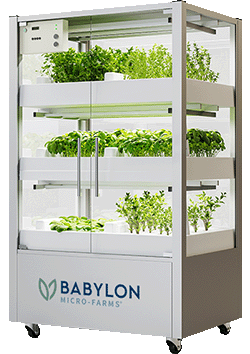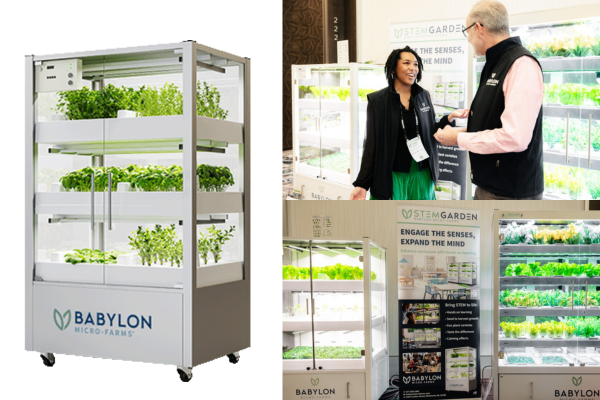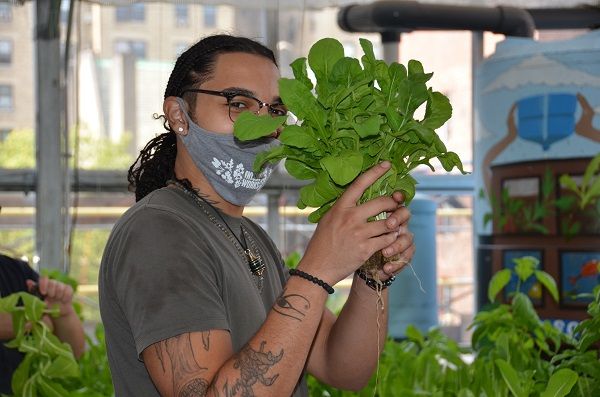Babylon Introduces The STEM Garden At Indoor Ag-Con 2024
(Richmond, VA) Babylon Micro-Farms, Inc., North America’s leading manufacturer of on-site, modular vertical farms, officially launched its latest Micro-Farm, the STEM Garden, designed for the education market. The team showcased the new design at Indoor Ag-Con, March 11-12, 2024. The company is taking pre-orders and will begin shipping units in June 2024.
Their latest Micro-Farming system is designed to engage the senses and expand the mind by delivering an accessible and affordable interactive farming experience to the education market. After delivering Micro-Farms to hundreds of locations worldwide, Babylon has collected feedback from a wide range of educators to inform the design for the STEM Garden. Their engineering team has carefully designed the product to deliver the highest-quality farming experience available to educators at an accessible price point. STEM Garden is simple, reliable, and configurable, making it a workhorse for teaching various science, technology, nutrition, and mathematics topics.
Alexander Olesen (CEO & Co-Founder) said, “The STEM Garden represents the next step in our journey to make hydroponic agriculture accessible to all. We have set the standard for safe, reliable, remotely managed vertical farms manufactured here in the USA, enabling anyone to become an indoor farmer. The STEM Garden is an accessible device that significantly expands the market for on-site vertical farms in the classroom and, eventually, home.”
After researching the education space over the last few years, Babylon has created a versatile growing system to engage, educate, and inspire students by bringing farm-to-table into the classroom. Here are some of the key features:
 Hands-on Learning – Removable trays in workstations promote hands-on learning for crop planting, nurturing, and harvesting.
Hands-on Learning – Removable trays in workstations promote hands-on learning for crop planting, nurturing, and harvesting.
Classroom-Compatible – Our design fits K-12 classrooms, maximizing space without compromising on the quality of education.
Student Led-Experiments – Designed for simplicity, our unit encourages students to work together, promoting teamwork and collaboration skills.
Exciting Seed Varieties – Students can explore the world of plant biology in depth, including different leafy greens, herbs, flowers, and microgreens.
Educational Integration – Get lesson plans and materials for hands-on gardening integrated into your curriculum.
Food Safe Cultivation – Our enclosed and locked gardening system ensures ideal plant growth with minimal effort and a more efficient and secure learning environment.
A dietician with Aramark at VCU, Julia Danisewicz RD, said, “We love our Babylon Micro-Farm; our students love the knowledge that their food was grown just a few feet away. As a dietician, seeing a university like VCU value sustainable, pesticide-free food choices for its students is exciting. I didn’t have a green thumb before working with the farm, but it is so easy to use that now I feel like a pro.”
The STEM Garden is available for pre-order today. Access the info sheet, spec sheet and please sign up for the waitlist here.
About Babylon
Founded in 2017, Babylon provides an indoor farming service to enable businesses and communities to have a year-round supply of ultra-fresh produce at the touch of a button. They manufacture all their products in the United States. The BabylonIQ software platform remotely manages the modular vertical farming systems network to make sustainable agriculture accessible to institutional food service clients like Compass, Aramark, and Sodexo. The service includes semi-automated vertical farms, software, and supplies wrapped into a flat monthly fee.
Link to TED Talk: Watch my TEDx Talk on “The Next Generation of Vertical Farming
Link to Times Magazine: Top Greentech Companies 2024


 For more than 10 years
For more than 10 years